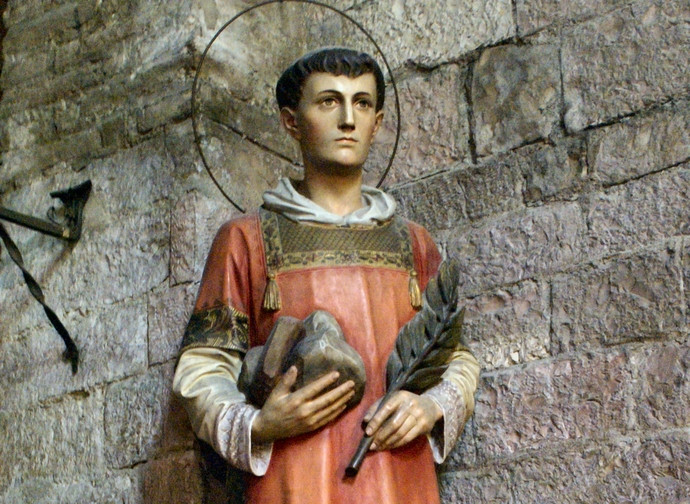Saint Stephen
"Lord, do not impute this sin to them", were the last earthly words of Saint Stephen, the first Christian martyr, who testified his faith in the Risen Christ without fear of death and, as a faithful in Christ, imitated him to the exent of asking God to forgive his executioners.

"Lord, do not impute this sin to them", were the last earthly words of Saint Stephen, the first Christian martyr, who testified his faith in the Risen Christ without fear of death and, as a faithful in Christ, imitated him to the exent of asking God to forgive his executioners. His liturgical celebration was set by the ancient Church on December 26th, precisely because in the days immediately following Christmas they wanted to remember the comites Christi, that is, the "companions" closest to Jesus' life witness: the proto-martyr Stephen on December 26th; Saint John the Evangelist, the beloved apostle, on December 27th; the Holy Innocents, that is, the children killed by Herod in an attempt to eliminate the child Jesus on December 28th. For the same reason, the Christmas liturgy originally included the solemnity of the Saints Peter and Paul, later moved to June 29th.
The Acts of the Apostles present the figure of Stephen in the episode which describes the discontent of the Greek-speaking Jews towards the other Jews because, "while the number of disciples increased", the former believed that their widows were neglected in the daily distribution of food. This was at the time of the early Christian community, in which the faithful shared all their goods. To solve the problem, whilst unable to take time away from the ministry of the Word, the Twelve summoned the disciples, inviting them to choose among them "seven men of good reputation, full of Spirit and wisdom" to whom to entrust that service. Saint Luke mentions Stephen, "a man full of faith and of the Holy Spirit", as the first of the seven elected, alongside Philip, Prochorus, Nicanor, Timon, Parmenas, and Nicolaus of Antioch, on whom the Apostles – after praying – laid hands, a fact in which the Church sees the institution of the Diaconate.
While the Christian community of Jerusalem continued to grow and Stephen performed miracles and spoke with an "inspired wisdom" which no detractor could counter, the envy that arose in the synagogue of the Freedmen (descendants of the Palestinian Jews, enslaved by Pompey in 63 BC) urged the latter to stir up the people, the elderly and the scribes, dragging Stephen before the Sanhedrin, where he was accused of blasphemy by false witnesses in the presence of the high priest. It was then that Stephen, his face "like that of an angel", began a speech, the longest in the whole Acts, in which he reconstructed the history of salvation from Abraham to the prophet Isaiah, going through the twelve patriarchs, to finally exhorting his accusers to convert to Christ: «You stubborn people, with uncircumcised hearts and ears. You are always resisting the Holy Spirit, just as your ancestors used to do. Can you name a single prophet your ancestors never persecuted? They killed those who foretold the coming of the Upright One, and now you have become his betrayers, his murderers. In spite of being given the Law through angels, you have not kept it.'"
The anger of those present at the Sanhedrin overflowed when Stephen, staring at the sky and seeing the glory of God, said: "'Look! I can see heaven thrown open, [...] and the Son of man standing at the right hand of God.'" Among the furious cries of his enemies, who stopped their ears not to listen to him, Stephen was attacked and dragged outside Jerusalem. While he invoked forgiveness for his executioners, those who stoned him laid their cloaks at the feet of the young Saul, the future Saint Paul, who was among those who approved of his death: Saul would continue to persecute the Church until his conversion on the road to Damascus, the fruit of an extraordinary grace to which he responded by proclaiming Christ tirelessly and suffering for him until his own martyrdom.
Patron of: deacons
